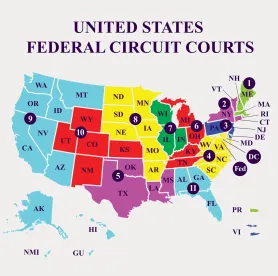At the end of last month, the Sixth Circuit decided that two cases involving complex, multiparty litigation did not belong in federal court.
Boal v. DePuy Orthopaedics, Inc. involved twelve consolidated suits brought by foreign plaintiffs and ultimately dismissed by the district court on the basis of the forum non conveniens doctrine. The plaintiffs, all citizens of either Spain or the United Kingdom, sued six corporate defendants, all based in the United States except one, which was incorporated in the United Kingdom and did most of its business there.
Although the suits were initially filed in 2012—in the Northern District of Ohio as part of an MDL involving faulty hip-replacement devices—the basis for the district court’s diversity jurisdiction was never called into question until the appeal. Judge Murphy, writing for the unanimous panel, explained: “Before argument, we asked the parties whether the district court had diversity jurisdiction. The plaintiffs have since called this jurisdictional issue a ‘technicality,’ noting that ‘[t]his was the first time the issue of subject matter jurisdiction’ had been raised.” However, the court was quick to point out that “‘[m]uch more than legal niceties are at stake’ when courts exceed their jurisdiction.” Indeed, “[i]n any case, large or small, the exercise of the ‘judicial Power’ by a court that has not been granted it ‘offends fundamental principles of separation of powers.’”
Through a series of hypotheticals reminiscent of 1L Civil Procedure, the court explained the intricacies of 28 U.S.C. § 1332, demonstrating why “complete” diversity was lacking on the facts of the case. Furthermore, allowing the parties to amend their complaint would be inappropriate because the statement of jurisdiction was not merely defective-but-obvious; it was substantively lacking.
Accordingly, the court vacated the district court’s forum non conveniens ruling and remanded for further proceedings. “For some 200 years it has been the rule that—no matter the time and resources spent—an appellate court must wipe out everything that has occurred if the lower court lacked jurisdiction.” Nearly eight years after litigation began, the court said the outcome of this appeal should “serve as yet another reminder that it ‘behooves parties to be meticulous in jurisdictional matters.’”
The second jurisdictional decision from the same day, Nessel v. AmeriGas Partners, L.P., involved a lawsuit filed by Michigan’s Attorney General in state court against the state’s largest residential propane provider, alleging numerous violations of the Michigan Consumer Protection Act. After Defendant AmeriGas had attempted to remove the case to federal court under the Class Action Fairness Act of 2005, the district court found that the suit “did not qualify as a ‘class action’ . . . for purposes of CAFA removability” and remanded the case back to Michigan state court.
Affirming the district court’s decision, Judge Clay’s majority opinion found the text of CAFA decisive. “[U]nder CAFA, removal jurisdiction exists only when a class action is brought pursuant to Rule 23 [of the Federal Rules of Civil Procedure] itself or a ‘similar’ state statute.” Referencing Merriam-Webster and the OED, the court found that the MCPA was not “similar” to Rule 23. The federal rule required the representative party to be truly “representative” of the class—thanks to Merriam-Webster, once again: “a typical or characteristic example.”
Here, the court noted, the MCPA did not require the Attorney General to be a member of the class at all. And although the statute allowed her to seek damages on behalf of Michigan citizens, it “does not require the Attorney General to have suffered any injury at the hands of Defendants or to otherwise assert claims that are typical to the consumers on whose behalf she is bringing this lawsuit.” Therefore, although the MCPA used the label “class action,” it failed for the purposes of removability under CAFA because it did not require a suit brought by the Attorney General “to satisfy the core requirements of a federal class action.” Accordingly, the Sixth Circuit affirmed the district court decision, which it pointed out was in line with decisions from the 2nd, 4th, 7th, and 9th Circuits.
Judge Nalbandian concurred in the judgment. In his opinion the text of CAFA was ambiguous as to the question at hand, but he resolved that ambiguity with reference to the purpose of the statute and thus reached the same result as the majority.



 />i
/>i
